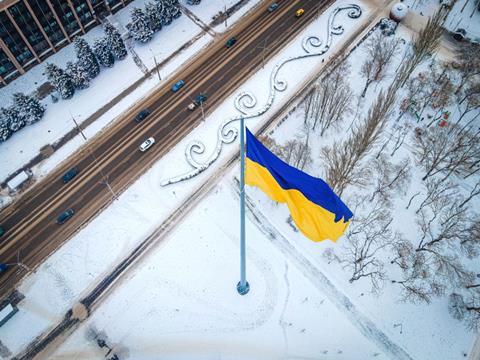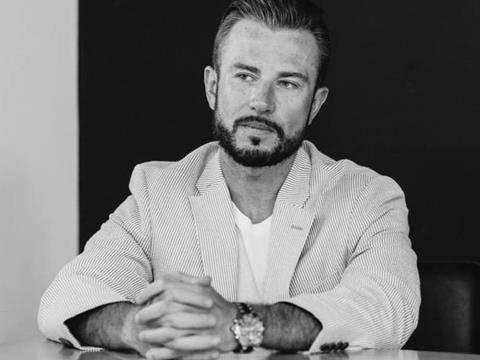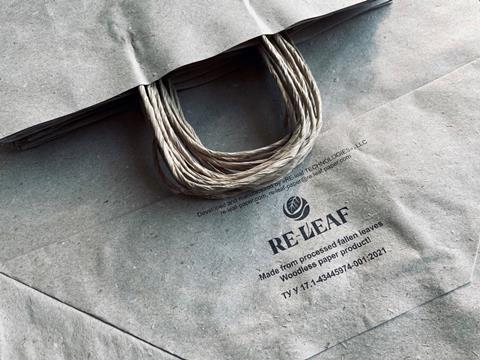
We spoke with Alexander Sobolenko, chief business development officer and co-founder of the Ukrainian company Re-Leaf, about the devastating impacts the war in Ukraine has had on its operations, how it will use its adaptable technology to re-build, and what the packaging industry can do to continue supporting Ukraine.

How is the war in Ukraine impacting Re-Leaf as a company?
Only three weeks have passed since our last talk with Packaging Europe, but the situation at Re-Leaf has turned on its’ head.
On February 24th, 2022, Russian air forces attacked multiple cities all over Ukraine and full-scale war began. Against the background of numerous victims and destructions, Re-Leaf’s business activity is paralyzed.
Once we ensured the safety of our families and employees, we’ve started to assess the loss. Our contracted paper mill in Lutsk city has suspended their activity. Another vendor for paper bag manufacturing had their premises in Kharkiv – a million-person city in the East which is half-destroyed after 15 days of siege. The communications system is down, but we are more worried about these people rather than our materials left there.
We lacked two days to finalize projects with known cosmetics brands NYX and Kiehl’s – their paper bags were almost done.
I was forced to leave Kyiv after residential housing was struck by Russian missiles and now I’m temporarily living in the Central-West part of Ukraine while my children have moved to Slovakia.
The impact is terrifying, but now we care more about our country, not about business.
What measures has Re-Leaf taken in response to the war in Ukraine?
We were definitely not prepared for this. It was hard to believe that it could happen, therefore we didn’t have any specific disaster plan.
It was too late to evacuate our warehouse and employees and once we ensured that people were safe, we’ve been focused on supporting the Ukrainian Army. Re-Leaf initiated charitable fundraising among our foreign customers and partners. Not too much, but we transferred around €10,000 to the Armed Forces of Ukraine.
From the first day of war, we got no orders either from internal customers or from the European Union. We have some stock of paper we’re about to sell off and donate all the money to refugees and victims of war. However, even exportation of these goods to the EU now looks very challenging.
In the last week, we have started working on a plan of relocation of Re-Leaf to other countries and building new business from scratch. That’s the only possible measure for saving the company in existing circumstances.
Re-Leaf started as an idea from your CEO and co-founder, Valentyn Frechka, who worked on a project to obtain cellulose from fallen leaves while he was attending school. How do you think the war in Ukraine will affect this kind of innovation?

Valentyn did a great job inventing the revolutionary Re-Leaf technology. What we lacked is a few more years to turn it into a billion-dollar business in Ukraine. War interrupted our plan as well as thousands of lives and a slower pace in a peaceful country.
Fortunately for Re-Leaf our key asset is intangible, and we hadn’t managed to build our own unwieldy infrastructure yet. Theoretically having our existing technology, we can replicate Re-Leaf in any location if there are leaves and demand for paper and packaging. And that’s what we are doing now – we are researching opportunities to enter the markets of France, Germany, the Netherlands, the UK, the USA, Canada, Japan, and other countries.
We look forward to raising the funds to launch factories in the key markets and we are open to any partners and investors which would like to finance Re-Leaf technology. I’m sure that this innovation will conquer the world even faster than we predicted it would before war started. All “made in Ukraine” goods or services have started to receive special attention globally because of worldwide solidarity.
Lack of resources and growing costs will accelerate the use of alternative sources for paper and packaging. It inspires confidence that very soon Re-Leaf as a company will become an international player and game changer in the packaging market.
What impact do you think the war in Ukraine will have on the paper industry as a whole?
The impact of the war in Ukraine on the paper industry is not yet fully evident.
What we already see is rising prices for raw materials, which is affecting businesses internationally. Ukrainian paper companies suspended their activity, Russian companies have badly lost sales and revenues, foreign companies have left Russia on a massive scale.
On a macro level, it is difficult to predict medium and long-term consequences. On our level, we are faced with a lack and growing cost of waste paper traditionally imported from the EU to Ukraine.
Another obvious and visible issue is the growing cost of natural gas and other natural resources. We can’t even calculate the cost of our products because energy prices are very uncertain and changing rapidly.
The freezing of Ukrainian companies won’t have a significant impact on the global industry because the share of local enterprises is not decisive. So it seems that the biggest impact on the industry is the demarche of huge international companies that have decided to leave the Russian market to avoid reputational risks.
What do you think of the packaging industry’s response to the war in Ukraine so far?
I see the solidarity of some packaging companies with other industries that have decided to close their businesses and leave Russia to avoid financing war and the existing regime by paying taxes, etc. I can imagine their financial losses and that makes their position and decision even more valuable and appreciated.
Also, we feel a lot of support from foreign customers and partners which share their support to Ukraine and our company, donate to our Armed forces, and provide humanitarian assistance.
Before the war started, we got a lot of requests from Russia regarding our franchise and joint business opportunities. Now we are firmly committed to being apart from this country and avoiding doing business in Russia or with Russian companies. Our peaceful technology should benefit only peaceful countries and democratic societies.
Going forward, how can the packaging industry support its Ukrainian colleagues?

The best thing the packaging industry can do to support its Ukrainian colleagues is to continue buying “Made in Ukraine” products.
Some local paper enterprises, in their attempts to survive, have not closed down completely. Businesses try to pay salaries, utilities, and other expenditures to support their employees and overall economic turnover.
Not a single entrepreneur is caring now about profits, but everyone is trying their best to save the country’s economy and provide other people with means for living.
So, by buying Ukrainian paper, packaging, or services, other companies contribute immensely to the survival of the Ukrainian economy and human lives.
Ukraine has already proved to the world its courage and democratic values. We are very optimistic about the outcome of the war. As soon as it is over, Ukraine will be reintegrated with global markets, great restoration will lead to skyrocketing economic growth, and Ukrainian companies will play an increasingly significant role in the industries of paper and packaging. There will also be excellent opportunities for the international companies to invest into the Ukrainian market instead of a market they’ve recently left.
















No comments yet